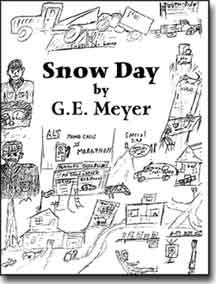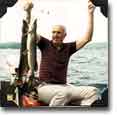

This month we are happy to bring another contribution by G.E. Meyer, of Bremen, Indiana. Snow Day will be presented in several parts, we will be adding a new part each week until the story is finished. We have also enjoyed his writings Memories From the Road, 1949: A Hitchhiker Remembers US 40, and Memories of a Southern Indiana Vacation in previous issues.
Snow Day recalls the sometimes touching, sometimes hilarious adventures Dr. Meyer encountered as he set out to deliver a truckload of books through a winter snowstorm. We hope you enjoy the story! |
Part 1
I was heading into Michigan. It was snowing and it was cold, nearly zero. Schools were closed and I wondered if I had been foolhardy to venture out at all. I quickly reviewed the events which brought me here. Jon Fischer had asked me the night before if I would like to leave early to take a load of books to Zondervan’s in Grand Rapids. The weather was fine then. During the night it started to snow and b y the time I left home the schools had been closed.
When I arrived at the press I asked Dale what he thought and he wasn’t much help.
“It’s up to you. The truck’s all loaded. If you see the roads are too bad just stop. You don’t want to get stuck out there in the country.”
Linda Spears, busy as always packing books, gave me a motherly smile and reminded me that the schools were closed and it would probably be worse in Michigan.
I decided to go ahead. As I self-consciously walked out to get in the truck I felt everyone watching. I was clearly the “new kid on the block” and was still trying to establish myself as a viable personage. Whatever happened today would either mean that I was bold enough to brave the elements or too dumb to stay off the roads when everyone knew they were bad.
The truck started easily and I headed up State Road 19. The roads were clear and the wind was blowing, but not hard enough to obstruct my vision. I was glad I had worn extra clothes that day because the heater was going full blast but it was not really comfortable in the cab. The fan had only one speed, wide open, and today it was making a strange noise. I thought I would put a piece of cardboard in front f the grill when I got to Zondervan’s in Grand Rapids to help with the heat. I was even beginning to allow myself to feel a sense of pride for braving the elements this cold day.
I was making good time too. I could unload and be home by 2:00 in the afternoon. But suddenly the old Chevy just stopped. No warning, no sputter, no hesitation whatsoever. I reached down to switch the gas lever to the main tank, but knew before I did the effort was futile. If inanimate objects are able to communicate, this was a time. The motor stopped with such finality that I was just able to roll to the side of the road. In case I still questioned her intentions, a cloud of smoke issued from the dash and the smell of burning electrical wires permeated the cab. I reached down and turned off the switch. The smoke subsided, but the odor remained.
I got out and looked under the hood. Everything seemed normal there. The trouble seemed to be confined to and securely shielded from view somewhere inside the dashboard. I crawled back inside the cab to contemplate my next move.
I had been sidelined, benched, taken out of the game. No longer was I able to brave the winter storm, safely cocooned inside the protective cab. No longer was I able to maneuver my way to the front of the line at a stop sign. No longer could I pull up along side of the big shiny semis and pretend I was one of the vast army of rugged individuals who keep our nation’s economy strong by “hauling the freight”. No longer could I pull into a truck stop, saunter up to the counter, pull my Chicago Bears cap down over my eyes, turn up my collar and discuss the hazards of driving on the Dan Ryan, 34th Street, Western Avenue or Halstead Street with the seasoned 18-wheeler jockey next to me. Now I was only a spectator at the game of life.
Being a spectator on a cold day in a truck along a busy highway has its own dynamics. The heat quickly dissipates and the cold wind whistles around the windows and doors, driving the fine snow through cracks you didn’t even know existed. The windows fog over on the inside and snow settling around the edges of the windows slowly obliterates the light, creating a dark, tomb-like atmosphere inside the lifeless cab.
The sound of passing cars remind you how close you were to your destination. They seem heartless. Instead of seeing the stranded motorist as one of their own who has suffered misfortune and extending a warm helping hand, they seem to look with disdain upon an object which causes them a mild distraction as they continue their mad rush for their own date with destiny. The large semis mercilessly roar past, sending vibrations which rock a small truck and create their own snow squalls.
I reached down and turned the switch again, vainly hoping the old Chevy would have a change of heart after cooling down a bit. It was still dead, but just as a reminder of the truck’s resolve, another billow of smoke issued from the dash.
I zipped up my jacket and pushed the door open. Snow which had accumulated around the door sifted down my neck. I waited for a break in the traffic before stepping down to begin my search for help. The Plainwell exit which seemed so close while I was driving would be a long walk. I looked across the highway and saw a snowplow on the side street. Surely he would be able to help or at least tell me where I could find help.
I was crossing the highway when I spotted a form walking through the snow toward me. As I approached I could see he was a young man, probably in his early twenties. He was wearing a light jacket with a baseball cap bearing the untimely message “ANYONE WHO SAYS MONEY CAN’T BUY HAPPINESS DOESN’T KNOW WHERE TO SHOP”. It seems strange now that I should remember such an insignificant message when much more weighty problems confronted me.
“You having trouble?” he asked.
“Yeah, she quit on me. I think it’s the wiring.”
“Kind of a nasty day to be having trouble. Here, get in my pickup and we’ll see if we can get you some help.”
He was slight of build. His dark hair extended several inches below his cap, and his short black beard added to his self-assured manner. He wasn’t dressed for the cold. He wore a pair of faded jeans and no boots. His light jacket was only half buttoned, but he didn’t seem to mind.
“My name’s Oran. I’ve just been over to see my ex-wife. She lives just up there a little way.” He pointed to a row of small houses on a side street running parallel to the highway. I got in beside him, feeling grateful and relieved.
I was apologetic about imposing on his time, but he gave the impression that his whole mission in life, at least for that day, was to see that I was cared for. Indeed, from the first time I saw him walking across the highway to meet me, it appeared it had all been prearranged. He seemed like someone I had known all my life and it was not him helping find the solution to by problem, but us trying to find a solution to our problem. Some folks have that talent.
“Surely we can find someone who can get me fixed up so I can get going,” I thought. “Do you know any place I can get it fixed?”
“Sure,” he answered confidently. “We’ll go down here to the Marathon station first. If Al can’t fix it he’ll tell us where we can get it fixed.” Oran’s pickup was old but it ran well. He had several burlap bags half filled with junk. (I use the term “junk” respectfully because it would be difficult to identify the contents of each bag.) I was conscious of the condition and size of the pickup because I considered asking him to help deliver my load of books if there weren’t too many.
“Is this a half ton or three-quarter ton?” I asked.
His answer was evasive, but he did assure me it was capable of hauling anything that was demanded of it. I wasn’t convinced, so didn’t pursue the proposition.
We drove to the Marathon station. Al said he didn’t have any room to put the truck in and work on it, but would help find someone who would. He immediately went to the phone. The sign by his telephone was direct: Phone Calls 25¢. Al took over, did all the calling and nothing was mentioned about the cost. Unfortunately, no one had the facilities or the time to work on the truck. He did call the tow truck and arranged for him to meet us at the Chevrolet garage. “Surely,” I thought, “the Chevy garage will be happy to work on one of their own, a Chevy truck.” As I reflect on the scene at Al’s, I believe I was the only one who had confidence in General Motors.
We drove to the garage and entered the showroom. A salesman projecting polite enthusiasm met us immediately. When we told him our problem his enthusiasm waned and he pointed us to the shop. No one seemed busy in the shop, and it was practically empty.
“What luck!” I thought. “They’re not very busy today and will probably be able to get to it right away. Maybe I’ll get to meet Mr. Goodwrench.” I related my problem to the shop foreman. He listened with less interest than I would have liked, and guided me over to another man who sat in a small cubicle in front of a computer. He was young, bald, businesslike, and utterly lacking in compassion. When he looked up from his computer, his tired eyes fixed me with an icy stare as the foreman relayed my problem.
“What size is the truck?”
“It’s a straight truck.” I answered, as his glare penetrated and melted my self-esteem.
“How old is it?” Again, he hit a blind spot.
“I’m not sure. I don’t know exactly how old it is, but I think it’s about a 5-ton truck.” Oran nodded his head in agreement.
“Our books don’t go back that far.” He turned on his computer.
“It may not be that old.” I tried to explain, sensing I was losing the battle.
“We don’t go back that far.” I had lost him.
I turned to the shop foreman.
“Why don’t we bring it in and let you look at it?” I pleaded in desperation.
“Our books don’t go back that far,” the foreman repeated.
I think Mr. Goodwrench was off that day.
< On to Part II >
|